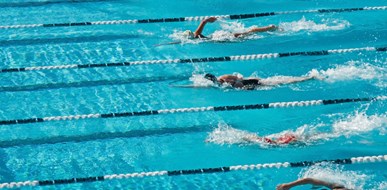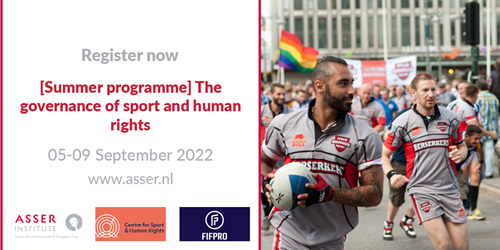[New blog post] Transgender women athlete exclusion in disguise: Assessing FINA’s ‘gender inclusion policy’ under International Human Rights Law
Published 22 July 2022
@istock
In a new article for Verfassungsblog, Asser researcher Dr Daniela Heerdt assesses a new policy by the International Swimming Federation (FINA). This policy prevents transgender women from participating in female competitions.
A heated debate about the participation of transgender and non-binary people in female competitions is on-going worldwide. Just last month, the International Swimming Federation (FINA) adopted a new policy which prevents transgender women from participating in its female top-competitions. Other international sport federations such as the International Rugby League and the Union Cycliste Internationale have similar policies in place: both recently adjusted their eligibility rules to the effect that they drastically limited the ability of “male-to-female” transgender athletes to participate in their competitions.
Reactions to this decision are twofold: there are athletes that praise it for protecting women’s sport (see here and here), and there are other athletes and human rights activists that criticise it for disrespecting human rights and the rights of transgender athletes in particular. This blog attempts to shed light on the latter in particular and argues that without any possibility for the affected group of transgender women athletes to participate in FINA’s top-competitions, the policy is disproportionate and discriminatory, and has the potential to violate other human and children’s rights.
Read the full article here
About Daniela Heerdt Dr Daniela Heerdt is a researcher in the field of sport and human rights. She has a background in public international law and human rights law and defended her PhD project entitled “Blurred Lines of Responsibility and Accountability – Human Rights Abuses at Mega-Sporting Events” in April 2021 at Tilburg University. The focus of the project was the question of how to establish legal responsibility for human rights harms that occur in the context of these events, including violations of rights of specific groups like children or migrant workers.Daniela also works as independent consultant in the field of sport and human rights for the Centre for Sport and Human Rights, or the European Parliament among other clients from the sports ecosystem.
Dr Daniela Heerdt is a researcher in the field of sport and human rights. She has a background in public international law and human rights law and defended her PhD project entitled “Blurred Lines of Responsibility and Accountability – Human Rights Abuses at Mega-Sporting Events” in April 2021 at Tilburg University. The focus of the project was the question of how to establish legal responsibility for human rights harms that occur in the context of these events, including violations of rights of specific groups like children or migrant workers.Daniela also works as independent consultant in the field of sport and human rights for the Centre for Sport and Human Rights, or the European Parliament among other clients from the sports ecosystem.
Advance your knowledge on sports and human rights
Join us for our unique summer programme on ‘the governance of sport and human rights’ taking place in person at the Asser Institute in The Hague 5-9 September 2022, jointly organised by the Asser Institute and the Centre for Sport and Human Rights. The programme is a first of its kind focusing on the link between the governance of sport and human rights, and zooming in on a number of challenges underlying this link, such as the human rights impacts of mega-sporting events, the rights of child athletes, remedies for sport-related human rights harms, and more. Participants will have the opportunity to learn from experts from the Asser Institute, the Centre for Sport and Human Rights, and FIFPro, as well as high-profile external speakers from both academia and practice. Register now.

